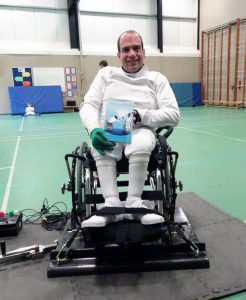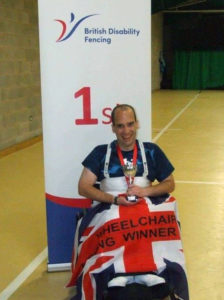British wheelchair fencer talks bouts and books
Jonathan David Collins is not afraid to be “framed.” In fact, the 30-year-old is willing to duel anyone for the privilege.
His new book, Into the Frame, invites readers into Collins’ world of wheelchair fencing in Great Britain and takes its title from the metal frame to which the athletes’ apparatus are fastened to keep them from tipping.

Collins himself has been finding workarounds in sports, and life, since he was born with spina bifida and hydrocephalus. Over the last five years, his physical and mental adaptations have involved competitive sword fighting. Adding to his personal challenges is that he’s the only wheelchair fencer competing in the United Kingdom who is severely sight impaired.
“I didn’t know what to expect when a friend introduced me to the Chichester Fencing Club for the first time,” Collins said in an email interview from his home in Selsey, on the southern coast of England.
Collins admitted that getting acquainted with the basics was intimidating but impactful.
“I was kitted up in the proper clothing. I was given a mask to put on, and when a weapon was placed in my hand, it felt amazing and I really felt its power,” he said.
Wheelchair fencing is an original Paralympic sport developed in post-World War II England. Minor modifications to the International Fencing Federation (FIE) rules allow disabled fencers to fence all three standard Olympic weapons – foil, sabre and épée. The biggest difference is each fencer’s seated position.
“In able-bodied, fencers lunge forwards and backwards, along a 14-meter [about 46-foot] long area called the piste.”
Depending on the fencer’s disability, torso or arm movement, such as lunging in the wheelchairs, replaces fancy footwork, although the proximity of the two athletes actually increases the pace. The sport is scored using electronic sensors that indicate when contact is made with the opponent’s trunk in foil and above the waist in sabre and épée swordsmanship.

“Although wheelchair fencers also appear in team events, it is up to your ability, strength and mental agility to compete the best you can, but there is no team pressure as in wheelchair basketball,” Collins said.
And he should know, since his book was published in 2019 to provide insight into the sport.
“It contains facts about equipment and etiquette, plus some of the best wheelchair fencers in the world provided stories for it,” he said.
His reason to start writing in 2016 was that there was still little known about the sport.
“Despite that, the U.K. has top fencers, like Piers Gilliver, who won a silver medal in the 2016 Rio Summer Paralympics,” Collins said.
Collins’ achievements include taking part in the Novice Challenge at the 2018 British Disability Fencing National Championships. That year, he won a gold medal in mixed sabre and a joint bronze in mixed foil.
Collins’ coach is retired wheelchair fencer Viv Mills, who is well known as the former British champion at women’s sabre for the national squad. Collins said it is a good match for him to train with her since they share a desire to be outspoken about the sport’s development.
Mills serves as an ambassador for the International Wheelchair and Amputee Sports Federation (IWASF), is secretary for the British Disability Fencing Association (BDFA) and is the founder of The Sabre Trust.
“I have gained so much from learning wheelchair fencing that I would recommend this to everyone, to try it and have fun,” Collins said. “It is suitable for most disabilities and amputees. You use a wheelchair to participate in the sport but do not have to be full time in a chair in your daily life.”
Collins takes great pride in his followers and says the book has helped him to tell his story.
“I have thousands of contacts on social media, and there has been a lot of interest about starting clubs,” he said.
Despite the fact that this year, the novel coronavirus (COVID-19) pandemic restrictions have upset his personal training practices, he remains committed.
“Coronavirus stopped training camps, but I have a target board that I use for practice sessions at home,” he said. “Normally, I enjoy the interactions between young able-bodied club fencers who want to fence against me.”
“I have achieved some medals over the years and they have given me the will to improve my skills,” Collins said of his big goals. “It would be great to win more prestigious titles, but I am happy with what I do. The main thing in my life is to get wheelchair fencing more widely known and with Into The Frame, I have started to achieve this. There are some things I can’t change, like being in a chair, but I will show the world what I can do.”
You can follow Collins and find Into the Frame for purchase at the following links. Those in the U.S. can find more resources at: https://www.usafencing.org/parafencing. In the U.K., visit: https://britishdisabilityfencing.co.uk.
sns
If you know of someone we should know, please contact us at sns@pvamag.com